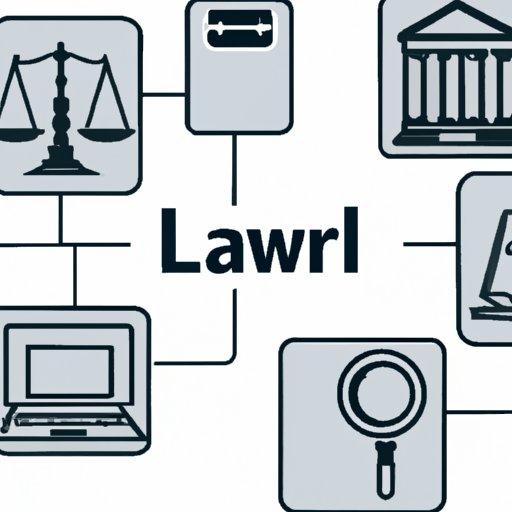Introduction
Lawyers must remain up-to-date on the latest technologies in order to provide their clients with the best possible legal services. Technology is becoming increasingly important in the legal profession as it makes processes more efficient and cost-effective. In this article, we will explore the various types of technology used by lawyers as well as the benefits and implications of technology in the legal profession.
Comprehensive Guide to the Latest Legal Technologies
As technology continues to evolve, lawyers must keep up with the latest advancements in order to stay competitive. According to a survey conducted by the American Bar Association, “nearly two-thirds of lawyers reported using at least one type of technology in their practices.” The most common types of legal technology used by lawyers include document automation, artificial intelligence, e-discovery, cloud computing, and case management software.
Document automation is a popular technology used by lawyers to streamline document creation. Document automation tools allow users to quickly create documents such as contracts, wills, and pleadings with minimal effort. These tools also have built-in intelligence that can help lawyers spot errors or inconsistencies in their documents.
Artificial intelligence (AI) is another technology used by lawyers to improve efficiency. AI-powered tools can be used to automate tedious tasks such as research, drafting documents, and customer service. AI can also be used to analyze large amounts of data quickly, allowing lawyers to make better decisions faster.
E-discovery is a technology used by lawyers to quickly and easily access evidence in litigation cases. E-discovery tools allow lawyers to search through large amounts of electronic data quickly and accurately. This technology can save time and money by reducing the amount of time spent manually searching for evidence.
Cloud computing is a technology used by lawyers to securely store and share files with clients. Cloud-based solutions allow lawyers to access their files from any device, making it easy to collaborate with clients and colleagues. Additionally, cloud storage solutions provide lawyers with additional security measures to protect their data from cyber threats.
Case management software is a technology used by lawyers to manage their caseloads. This type of software allows lawyers to organize their cases, track deadlines, and communicate with clients. Case management software can also be used to generate reports and analytics, which can help lawyers identify trends and make better decisions.

How Technology is Transforming Legal Practice
The use of technology in the legal profession has had a significant impact on the delivery of legal services. According to a study conducted by the National Center for State Courts, “the use of technology has allowed lawyers to reduce costs and increase productivity, while providing better access to justice for their clients.” Technology has also enabled lawyers to work remotely, eliminating the need for expensive office space.
The use of technology has also changed the way lawyers practice law. Automation and AI have allowed lawyers to automate mundane tasks, freeing them up to focus on more complex issues. Additionally, technology has made it easier for lawyers to collaborate with other professionals, such as paralegals, investigators, and experts, which can lead to better outcomes for their clients.
There are a variety of legal tech solutions available to lawyers. Popular solutions include document management systems, client portals, e-signature platforms, and virtual courtrooms. Each of these solutions can help lawyers streamline their processes and provide better services to their clients.
Conclusion
In conclusion, technology is becoming increasingly important in the legal profession. Lawyers must stay up-to-date on the latest advancements in order to provide the best services possible. Technology can help lawyers reduce costs and increase efficiency, while providing better access to justice for their clients. There are a variety of legal tech solutions available, including document management systems, client portals, e-signature platforms, and virtual courtrooms.
It is clear that technology is transforming the legal profession and the way lawyers practice law. By staying up-to-date on the latest advancements in technology, lawyers can ensure that they are providing their clients with the best possible services.
(Note: Is this article not meeting your expectations? Do you have knowledge or insights to share? Unlock new opportunities and expand your reach by joining our authors team. Click Registration to join us and share your expertise with our readers.)
